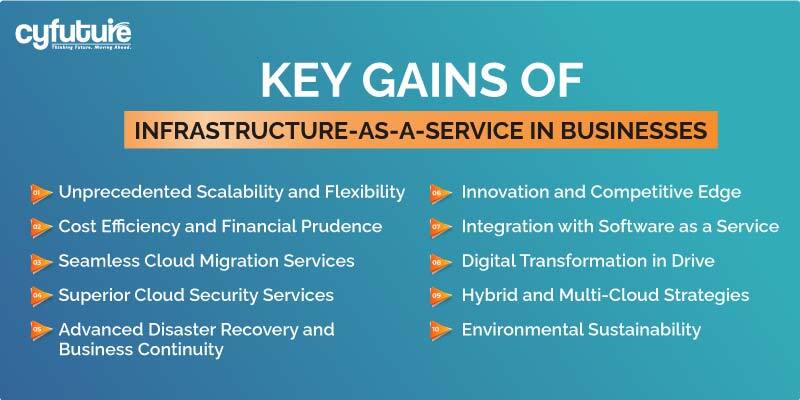-
Get Cloud GPU Server - Register Now!
Toggle navigation

Companies in the fast-changing digital world are constantly looking for newer avenues to stay competitive and become more efficient or scalable. One of the technological innovations that enterprises have set up and taken notice of is Infrastructure-as-a-Service (IaaS).
Navigating the intricacies of the modern commercial realm, it is increasingly apparent that Infrastructure-as-a-Service remains more than a trend and will transform how business as we know it should operate in the future.
In this Comprehensive post, we will delve into the deeper reasons why Infrastructure as a Service is becoming good for business providing insights on how it comprises cloud services, cloud migration, and security services while contrasting to Software As A Service (SaaS).
However, let’s take a look into a few stats and data before delving deep.

Now, let’s delve into the deep knowledge pool!
Recently, we have seen an admirable shift in the way companies are looking at their IT system — Infrastructure-as-a-Service (IaaS). In the past, companies used on-premises data centers with high upfront costs and expensive maintenance fees that did not scale.
Nonetheless, the advent of IaaS has been a game changer with its cloud infrastructure model that provides virtualized computing resources over the internet to its users. We are not talking of a technology-only change, but an enabler for businesses to be agile with the market conditions and customer demands.

The best part about this is that scalability and flexibility are the top reasons why IaaS has become the future of business. With an uncertain/ fluctuating demand variable coupled with that 100%- globalized market, businesses need infrastructure that can scale up and down without any friction.
IaaS offers this flexibility by allowing businesses to scale their IT resources up, or down as need be, without the need of large initial investment upfront. It provides agility for companies to adjust instantly and respond efficiently when growth opportunities or market disruptions arise and that admired model of operation it perpetrates be more resilient, and flexible.
Preparing for the TCO of going to Infrastructure as a Service (IaaS) is no mean feat. Moving to an IaaS model can drastically cut down costs related to capital expenses most companies have trended towards buying and maintaining physical hardware. Instead, they enjoy a pay-as-you-go model that flips capital expenses into operational expenditures.
This financial propriety not only helps take care of income yet in addition sets up a business to spend assets all the more deliberately. Furthermore, IaaS providers provide economies of scale which help in reducing the cost of computing resources hence optimizing the costs even more.
The cloud is an essential part of modern business transformation, and journey to the cloud. Cloud migration services are of paramount importance in promoting this transition, providing the framework required for smooth and secured application relocation to a cloud environment.
IaaS providers can deliver a full range of cloud migration services, including assessment, planning, execution, and optimization. Using a collective approach, organizations can reduce the friction and risk in this migration to leverage current cloud services as soon as possible.
Given the accelerating sophistication of modern cyber threats, strong security is more critical than ever. Since IaaS Providers realize the importance of Cloud Security, hence they spend a lot on advanced-level security infrastructure to protect their customer’s data and applications.
Cloud security services are designed for comprehensive protection across a range of possible attack areas such as encryption, identity and access management, threat detection, or compliance management. This allows businesses to strengthen their security position and keeps any secure information away from the line of fire with cybercriminals or regulatory violations.
It has very reliable disaster recovery capabilities to ensure that the business remains in operation despite unforeseen circumstances. IaaS protects businesses from disastrous scenarios by providing robust backup solutions that are automated, redundant infrastructure, and geographically isolated data centers all combined to help your business recover quickly.
This heightened resilience is essential to maintaining the trust of customers and conducting business with unprecedented certainty.
The most essential driving factor of modern enterprises is innovation, and IaaS acts as an enabler for incubating innovation. This leverage of managed IT infrastructure service allows businesses to dedicate their time and talent towards its core competencies, instead of getting involved in the management and streamlining tasks.
This change has led to an atmosphere of innovation, which allows organizations to innovate and launch new products and services much quicker. IaaS also enables access to advanced technologies like artificial intelligence, machine learning, and big data analytics that can help businesses gain a competitive advantage within their industry.
This symbiotic relationship with Software-as-a-Service (SaaS), further harmonizes the need for cloud IaaS in enterprise infrastructure for the future. Where IaaS offers the basic infrastructure, SaaS allows offering software applications over in the cloud.
For businesses, this integration is all about a holistic cloud ecosystem where you would have infinite possibilities in terms of both infrastructure and software solutions. Integration of IaaS and SaaS improves operational efficiencies — decreasing time to market, and enabling organizations to deliver great customer experiences.
With digital transformation long ago transitioning from buzzword to strategic imperative for businesses aspiring to sustained success, documentation — how we generate it and ensure its integrity through repeatable workflows has become ever more important. Flexibility, scalability, and innovation of IaaS to digital transformation; Therefore, IaaS is a staunch way of reforming the IT Infrastructure for businesses to go forward with conventional operations and data insights and make decisions in no time. Taking businesses on this transformative journey enables them to stay ahead of the curve, adjust more quickly, and reach desired results beyond just their immediate customer base.
The reason is clear in IaaS games hybrid and multi-clouds are powerful levers for business agility (and survivability). Hybrid Cloud — Integrates on-premises infrastructure with cloud services so that businesses can run workload by adapting it to its unique function. Where multi-cloud, on the other hand — uses more than one cloud provider to prevent vendor lock-in & improve redundancy. These tactics also allow companies to enjoy increased levels of control and security, while saving on IT costs by having their infrastructure uniquely tailored to meet the individual requirements and objectives a business may have.
In a time when environmental sustainability is of the utmost importance, IaaS provides an opportunity to become sustainable in their environment which benefits businesses and end users alike. In general, cloud service providers are increasingly emphasizing green operations such as the adoption of renewable energy sources or improved data center efficiency. They can thus opt for IaaS to achieve their goal of becoming greener by cutting down on carbon emissions and adopting it as a part of sustainable living. This is not only in line with corporate social responsibility but also improves brand reputation and ensures a loyal customer base.
Infrastructure-as-a-Service (IaaS) is more than just a technology breakthrough, it’s a strategic enabler that is transforming the future of business. IaaS offers tremendous scalability, cost savings, and security among other benefits to businesses that need to quickly adapt in the digital era. Going forward, IaaS adoption will only grow further enabling digital transformation, encouraging innovation, and securing our businesses. Adoption of IaaS is not simply a strategic option but the basic need which any business looking to sustain and prosper in days ahead cannot avoid.
The future of business is linked to Infrastructure-as-a-Service (IaaS). With the power of IaaS, businesses can access new capabilities that enable them to accomplish more than ever before- empowering innovation and business transformation for success now and in the future. IaaS has the potential as vast — even transformative — and its future in transforming business cannot be denied. As companies set themselves on a path toward the cloud, IaaS will certainly lead them to salvation and progress in an increasingly online environment.
One of the key components in digital transformation, IaaS helps businesses improve their IT infrastructure and processes by enabling modern technology—such as artificial intelligenceand big data analytics. This migration proves these companies are focused on creating a technology-focused environment that can deliver new products and services more quickly, create better client experiences, and win in an increasingly digital-first world.
IaaS supplies the basic infrastructure, but SaaS provides software through the cloud. The seamless integration between the two offers a complete native cloud ecosystem for companies to access infrastructure and software assets accelerating operational efficiency, time-to-market reduction and delivering excellent customer experience.
IaaS can solve the challenges relevant to customers that have dynamic IT needs, as it is scalable and flexible. For many small businesses, IaaS offers a way to share the cost among internal users as well with easier access than on-premises infrastructure; for large organizations that need to manage complex, global IT operations adopting IaaS can allow those groups some flexibility. This level of service provides an even playing field allowing businesses regardless how big or small to compete in the digital economy.